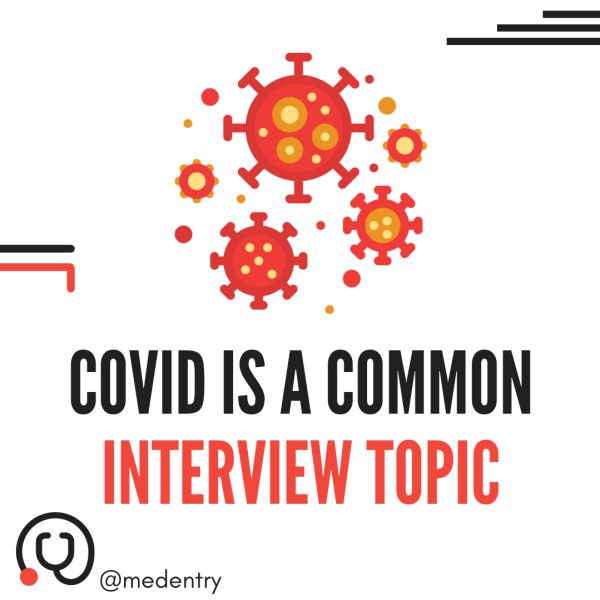Hot Topic: COVID Vaccinations (With Discussion of Medical Ethics)

1 year ago by Chris
The COVID pandemic and COVID vaccinations are common medical interview topics, since they have resulted in significant challenges to the healthcare system, and raise many ethical issues.
In this blog, we will be discussing the following medical interview question, and provide four key tips:
“Should people be forced to vaccinate in order to achieve herd immunity?”
Tip #1: Discuss both sides of the argument
Firstly, when approaching medical interview questions, you should always discuss both sides of the argument. This shows that you acknowledge and understand the opposing point of view, even if you may not agree with it.
For example, you could structure your answer as follows:
“Some would argue that people should be forced to vaccinate because… However, my opinion is that people shouldn’t be forced to vaccinate because…”.
Tip #2: Link your answer to the current climate
It is helpful to link the question or scenario to current events. For example, you could clarify that the COVID-19 vaccine was first administered to the elderly (those over 80, then those over 65), then the rest of the population, with vulnerable groups prioritised.
Nobody was ‘forced’ to have the vaccine - instead, it was highly encouraged. Additionally, you could mention whether herd immunity has been achieved - currently, most of the New Zealand population is vaccinated. This has meant that the spread of COVID and severe disease is limited, compared to the early stages of the pandemic.
Tip #3: Address the four pillars of ethics
You should consider the four ethical pillars of Autonomy, Beneficence, Non-Maleficence and Justice when formulating your argument.
Autonomy
The first ethical pillar of autonomy upholds the right of a patient to refuse treatment and to competently make informed decisions about their care.
In the scenario, forcing patients to be vaccinated would be unethical because patients would lose their autonomy. A more ethical way of approaching the issue would be to explain the risks and benefits of vaccinations to patients, inform them of the risks of not taking the vaccine, and respecting their decision if they choose to not be vaccinated.
Beneficence
The second ethical pillar of beneficence outlines doctors’ role in providing patients with the best medical care, in the patients’ best interests. This involves using evidence-based research, morally supporting patients and providing holistic treatment to each individual.
In this scenario, there is an abundance of scientific evidence to support the use of vaccinations in all patients (including elderly, children and immunocompromised patients). Vaccinations are proven to decrease symptoms, severe disease and the infectious period. There is little scientific evidence to support the anti-vaccine argument.
Non-Maleficence
The third ethical pillar of non-maleficence highlights doctors’ responsibility to ‘do no harm’. This means they should never act maliciously towards patients, and should ensure that treatments that are offered will not cause harm to patients.
In this scenario, doctors must consider the possible side effects of the vaccine and ensure that the benefits of the vaccine outweigh the risks. Overall, this is true of the COVID-19 vaccine, given those who are not vaccinated against COVID-19 are prone to severe disease. Furthermore, symptoms such as coughing increases the spread of the airborne pathogen, putting others (especially vulnerable populations like elderly and immunocompromised patients) at risk.
Distributive Justice
The last ethical pillar of distributive justice means that doctors should carefully consider the use of limited health resources, and use them in a socially responsible manner, to the benefit of the community.
In terms of the scenario, forcing everyone to have the vaccine may not be the best use of healthcare resources. This became apparent during the early stages of the pandemic, when the COVID vaccine was not freely available. Certain groups were prioritised (the elderly, vulnerable groups, immunocompromised patients).
Tip #4: Summarise and state your opinion
Towards the end of your argument, you should state your own personal opinion and any additional points you would like to add.
For example, you could discuss how forcing the population to get vaccinated may not be feasible as it would lead to public resistance, disruptions (protests and poor press, reflecting badly on the healthcare system). It could also lead to people having less trust in the healthcare system because they may feel they have lost the right to advocate for themselves and may feel coerced to make certain medical decisions.
You could also discuss the science behind the COVID vaccination, or discuss how herd immunity works (when a larger percentage of the population is vaccinated, this protects even the unvaccinated population because it limits the spread, protecting the most vulnerable populations).
It is important to come to a final decision, rather than ‘sit on the fence’. This demonstrates to the interviewers that you are able to consider both sides of the argument and formulate your own opinion.


